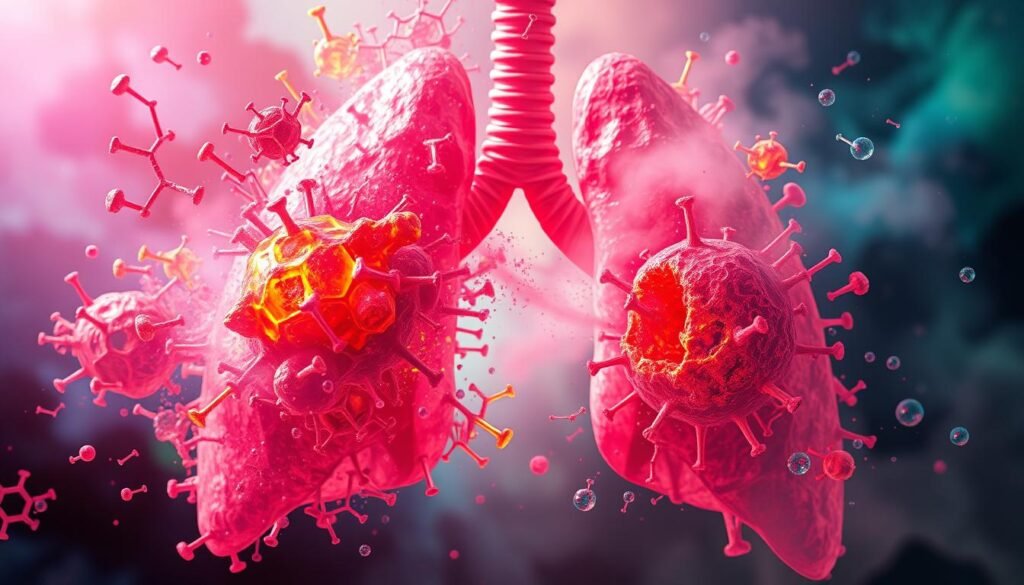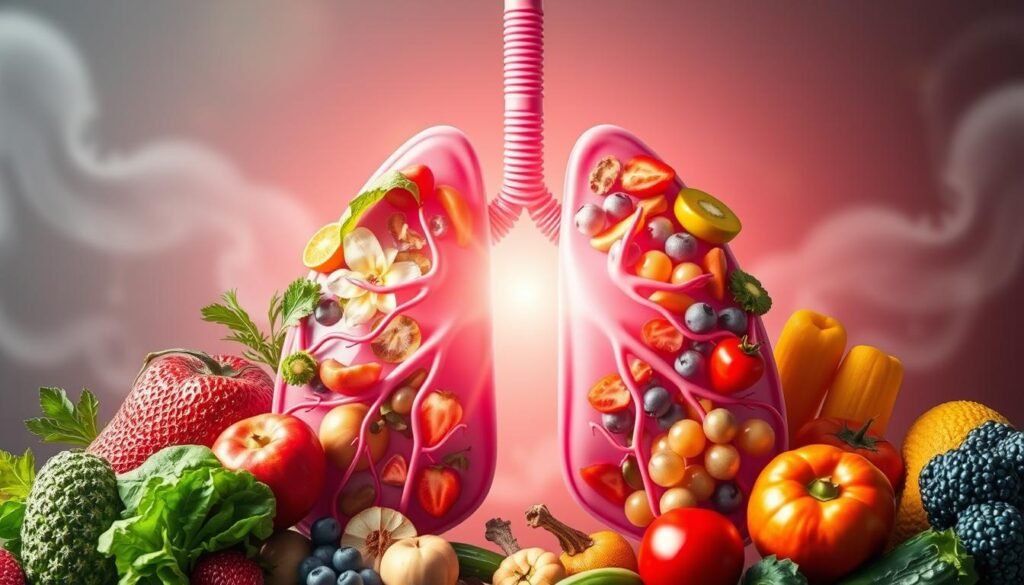More than half of U.S. adults have had lung health problems. That shows us how important taking care of our lungs is. Antioxidants are key in this. They protect our lungs from harm caused by free radicals. Eating foods full of nutrients is important for lung health. These nutrients fight off free radicals, reducing stress and the risk of lung issues. Knowing how antioxidants help can lead to making better choices for lung health.
Key Takeaways
- Antioxidants are crucial for preventing free radical damage in the lungs.
- A nutrient-rich diet supports overall lung health.
- Oxidative stress can lead to various respiratory issues.
- Understanding the role of antioxidants can empower healthier lifestyle choices.
- Prioritizing lung health is essential for overall wellness.
The Importance of Lung Health
Lung health is vital for our well-being. Our respiratory system helps us breathe by taking in oxygen and getting rid of carbon dioxide. This process is crucial for our survival.
When our lungs don’t work well, our bodies get less oxygen. This can make us feel tired and weaken our immune system. It’s important to keep our lungs healthy.
People with asthma or COPD need to take extra care of their lungs. These conditions can greatly affect their everyday life. Having healthy lungs means better oxygen flow in the body, which boosts energy and helps with physical activities.
Studies show that antioxidants can help improve lung function. For example, people with lung problems who eat more antioxidant-rich foods tend to have healthier lungs. It’s important to eat well to support our lungs. You can learn more about antioxidants and lung health here.
Understanding Free Radical Damage
Free radicals are unstable molecules made during normal body processes. They can cause big cellular damage. This happens when they take electrons from healthy cells. This leads to problems including oxidative stress. When there are too many free radicals, the body can’t stay balanced. This imbalance harms our health and lung function.
Pollution, cigarette smoke, and UV rays create more free radicals. This makes oxidative stress worse. Because of this, lungs can get hurt more easily. Harmful molecules build up in the lungs. This increases the risk of diseases like asthma and emphysema. The damage from free radicals builds up over time. It slowly harms lung tissues.
To prevent cellular damage from free radicals, we need to act early. Adding antioxidants to our diet helps. They give electrons to free radicals, making them less harmful. By knowing how free radicals affect lung health, we can make better choices. For more info, the National Center for Biotechnology Information is a great source.

Oxidative Stress and Its Effects on the Lungs
Oxidative stress hits lung function and health hard. It happens when harmful free radicals outnumber our body’s antioxidants. This imbalance can cause inflammation and harm lung tissues.
Chronic oxidative stress is behind many lung problems. Diseases like asthma, COPD, and lung fibrosis stem from it. They greatly limit how well lungs work. Knowing how oxidative stress affects breathing is key to better health.

Eating enough antioxidants is crucial in fighting oxidative stress. They take down free radicals, cutting inflammation. This may improve lung health. So, taking care of our lungs means knowing about oxidative stress and eating right.
| Respiratory Disease | Impact of Oxidative Stress | Potential Antioxidant Role |
|---|---|---|
| Asthma | Increased airway inflammation and hyper-responsiveness | May reduce inflammation and support respiratory function |
| COPD | Progressive lung damage and decreased airflow | Antioxidants may help slow disease progression |
| Lung Fibrosis | Scarring of lung tissue leading to breathing difficulties | Can potentially limit tissue damage and promote healing |
Antioxidants Protect Your Lungs
Understanding the role of antioxidants is key for healthy lungs. They shield your lungs from free radicals that cause cell harm. These nutrients stabilize radicals, helping lung function and well-being.
How Antioxidants Neutralize Free Radicals
Antioxidants give electrons to free radicals, neutralizing them. This action stabilizes the molecules, preventing lung cell damage. It’s crucial for keeping lung tissues healthy for good breathing.
The Role of Antioxidants in Reducing Inflammation
Antioxidants also fight inflammation in the lungs. This is critical for handling different breathing issues. Vitamins A, C, E, selenium, and flavonoids lower lung inflammation.

Types of Antioxidants Beneficial for Lung Function
It’s important to know about different antioxidants for healthy lungs. There are two main types: enzymatic and non-enzymatic antioxidants. Enzymatic ones like superoxide dismutase help fight harmful free radicals. They are crucial for keeping our lungs healthy by preventing damage.
Non-enzymatic antioxidants include vitamins C and E and polyphenols from fruits and veggies. These help our lungs by fighting inflammation. They also improve the health of lung tissues.
Each antioxidant kind has its role in protecting lung function. Adding a variety of these nutrients to your diet can boost lung health. It also fights inflammation in the respiratory system.
Top Antioxidant-Rich Foods for Healthy Lungs
Eating foods rich in antioxidants is key to strong lungs. These foods fight free radicals and reduce inflammation. They keep the lung tissue safe and help us breathe better. A mix of fruits and veggies is important for lung health. They give us the vitamins and minerals we need.
Fruits and Vegetables High in Antioxidants
Some fruits and veggies are especially good for their antioxidants. Examples include:
- Berries: Blueberries, strawberries, and raspberries are packed with antioxidants
- Citrus Fruits: Oranges, lemons, and grapefruits are rich in vitamin C
- Leafy Greens: Spinach and kale contain numerous vitamins and minerals
- Cruciferous Vegetables: Broccoli and Brussels sprouts offer powerful health benefits
Adding these fruits and vegetables to your diet helps fight harmful substances in the body. For tips on lung health, check out this helpful site.
Herbs and Spices to Enhance Lung Health
It’s not just fruits and veggies that help. Certain herbs and spices can boost lung health too:
- Turmeric: Known for its anti-inflammatory properties
- Ginger: Aids in reducing airway inflammation
- Garlic: Supports immune function and has antioxidant effects
Adding these herbs and spices to your meals can improve your diet. They offer more protection for your lungs. Eating a variety of antioxidant-rich foods helps you stay healthy and fight lung diseases.
| Food | Antioxidant Benefits |
|---|---|
| Berries | Fight free radicals, support lung function |
| Citrus Fruits | Boost vitamin C, enhance immune defense |
| Leafy Greens | Supply essential nutrients, reduce inflammation |
| Garlic | Enhances respiratory health, antimicrobial properties |
| Turmeric | Reduces inflammation, protects lung tissues |
Antioxidant Supplements: Do They Really Help?
Antioxidant supplements are getting more popular as people look for ways to keep their lung health strong. Products like vitamin C, vitamin E, and selenium are known for fighting oxidative stress. But, the research on the effectiveness of supplements shows different results.
Some research points out that these supplements might lower oxidative stress, which is good for the lungs. Especially for those at greater risk of lung problems, supplements could be beneficial. Yet, it’s crucial to weigh these pros against the possible cons. Taking too many antioxidants can sometimes harm your health.
The best approach is to get antioxidants from a diet full of fruits and vegetables. This way, you get the nutrients you need and support your overall health. If you’re thinking about antioxidant supplements, talk to a doctor first. They can help you decide if supplements are right for you based on your health.
Practical Tips for Incorporating Antioxidants into Your Diet
Adding antioxidants to daily meals can boost overall health, especially for the lungs. Start by eating more fresh fruits and vegetables. Colorful foods like berries, leafy greens, and oranges are full of antioxidants. These fight oxidative stress.
Also, use herbs and spices when cooking. Ingredients such as turmeric, ginger, and garlic enhance flavors and increase antioxidants in your meals. This supports a healthy diet and overall well-being.
Pick whole grains instead of processed foods. Whole grains are full of nutrients and fiber. They help with digestion and improve health. Eating a variety of foods ensures you get many antioxidants in your diet.
Drinking enough water is crucial for health. It helps the body work well, including the lungs. Being well-hydrated improves lung function and nutrient absorption.
Here’s a list of key fruits and vegetables that are high in antioxidants, with their health benefits:
| Food | Key Antioxidants | Health Benefits |
|---|---|---|
| Berries (Blueberries, Strawberries) | Flavonoids | Combat oxidative stress and inflammation |
| Spinach | Vitamin C, Vitamin E | Supports immune function and lung health |
| Carrots | Carotenoids | Improve vision and skin health |
| Nuts (Walnuts, Almonds) | Vitamin E, Selenium | Enhances cardiovascular health |
| Sweet Potatoes | Beta-Carotene | Boosts immune response and supports skin health |
For better lung health, look into dietary tips from trusted sources. Making smart food choices leads to a healthful, antioxidant-rich diet.
Conclusion
Antioxidants play a key role in keeping our lungs healthy. They fight the harm caused by free radicals. Eating foods and taking supplements with antioxidants helps improve lung health. It does so by reducing stress and swelling in our breathing system. People should eat more antioxidant-rich foods to better their lung function.
Eating lots of foods with antioxidants is good for our lungs. Being active and knowing about the air we breathe is also important. These steps help keep our lungs healthy. They improve our life quality too.
If you want to learn more about antioxidants, there’s a lot of new research. For example, the National Institutes of Health has interesting findings. A balanced approach to food, exercise, and clean air can make our lungs and overall health better.